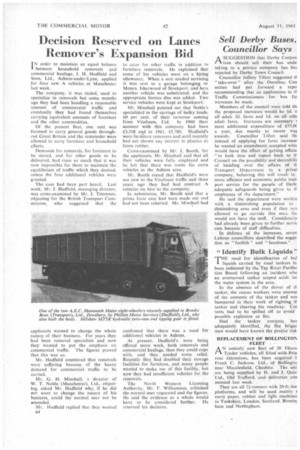Decision Reserved on Lanes Remover's Expansion Bid
Page 38

If you've noticed an error in this article please click here to report it so we can fix it.
I N order to maintain an equal balance between household removals and commercial haulage, J. H. Hadfield and Sons, Ltd., Ashton-under-Lyne, applied for four new A vehicles at Manchester last week.
The company, it was stated, used to specialize in removals but some months ago they had been handling a reasonable amount of commercial traffic and eventually they had found themselves carrying equivalent amounts of furniture and the other commodities.
Of the present fleet, one unit was licensed to carry general goods throughout Great Britain and the remainder were allowed to carry furniture and household effects.
Demands for removals, for furniture to be stored, and for other goods to be delivered, had risen so much that it was now impossible for them to maintain the equilibrium of traffic which they desired, unless the four additional vehicles were granted.
The case had been part heard. Last week, Mr. J. Hadfield, managing director, was cross-examined by Mr. J. Timmons, objecting for the British Transport Commission, who suggested that the applicants wanted to change the whole nature of their business. For years they had been removal specialists and now they wanted to put the emphasis on commercial traffic. The figures proved that this was so.
Mr. Hadfield countered that removals were suffering because of the heavy demand for commercial traffic to he carried.
Mr. G. Minshull, a director of W. T. Noble (Manchester), Ltd., objecting, asked Mr. Hadfield why, if he did not want to change the nature of his business, could the normal user not be amended.
Mr. Hadfield replied that they wanted n4 to cater for other traffic in addition to furniture removals. He explained that some of his vehicles were on a hiring allowance. When a unit needed servicing it was sent to a garage belonging to Messrs. Isherwood of Stockport, and here another vehicle was substituted. and the appropriate licence disc was added. Two service vehicles were kept at Stockport.
Mr. Minshull pointed out that Noble's specialized in the carriage of bulky loads, 60 per cent. of their turnover coming from Vitafoam, Ltd. In 1960 their account with this company had been f3,31S and in 1961. 0.780. Hadfield's were furniture removers and until recently had not shown any interest in plastics or foam rubber.
Cross-examined by Mr. J. Booth, for the applicants. Mr. Minshull said that all their vehicles were fully employed and he felt that there was room for extra vehicles in the Ashton area.
Mr. Booth stated that Hadfield's were not new to the Vitafoam traffic and three years ago they had had contract A vehicles on hire to the company.
In submission, Mr. Booth said that a prima facie case had been made out and had not been rebutted. Mr. Minshull had confirmed that there was a need for additional vehicles in Ashton.
At present, Hadfield's were being offered more work, both removals and commercial haulage, than they could cope with, and they needed some relief. Recently they had doubled their storage facilities for furniture, and many people wanted to make use of this facility, but now they had insufficient vehicles for the removals.
The North Western Licensing Authority, Mr. F. Williamson, criticized the normal user requested and the figures. He said the evidence as a whole would have to be considered further. He reserved his decision.




















































































































